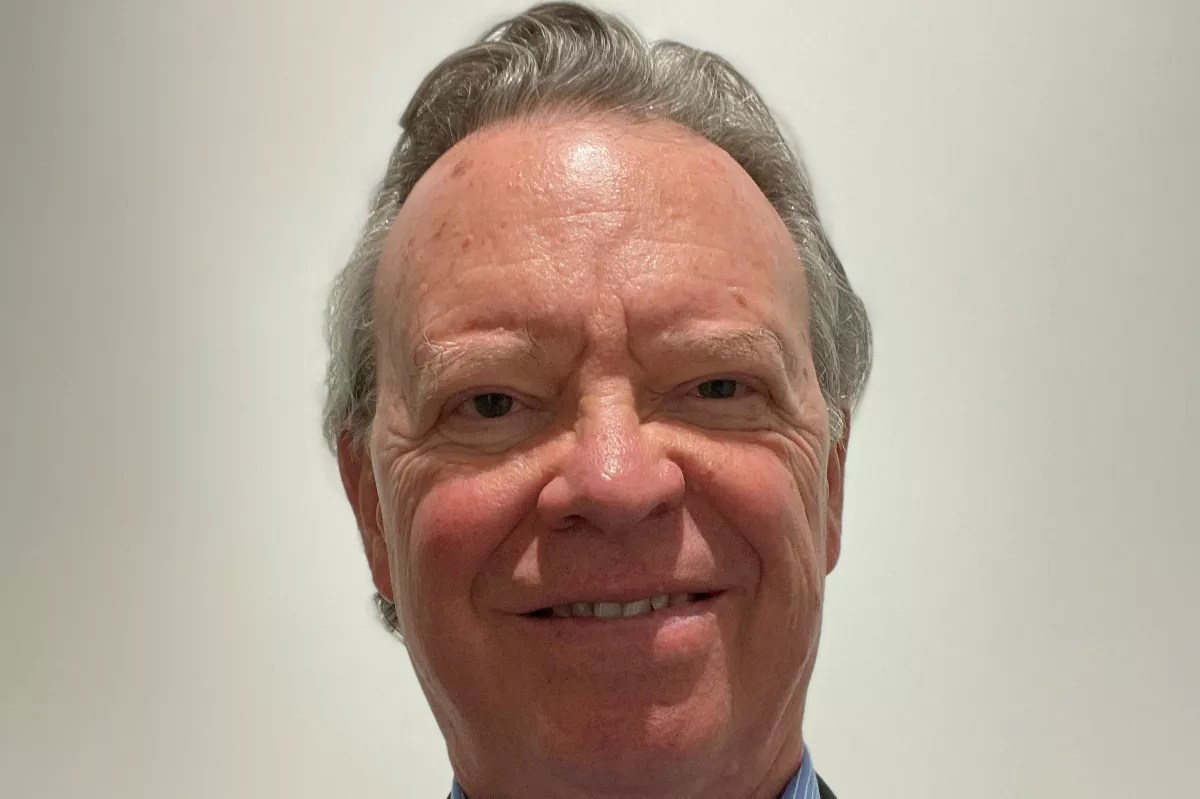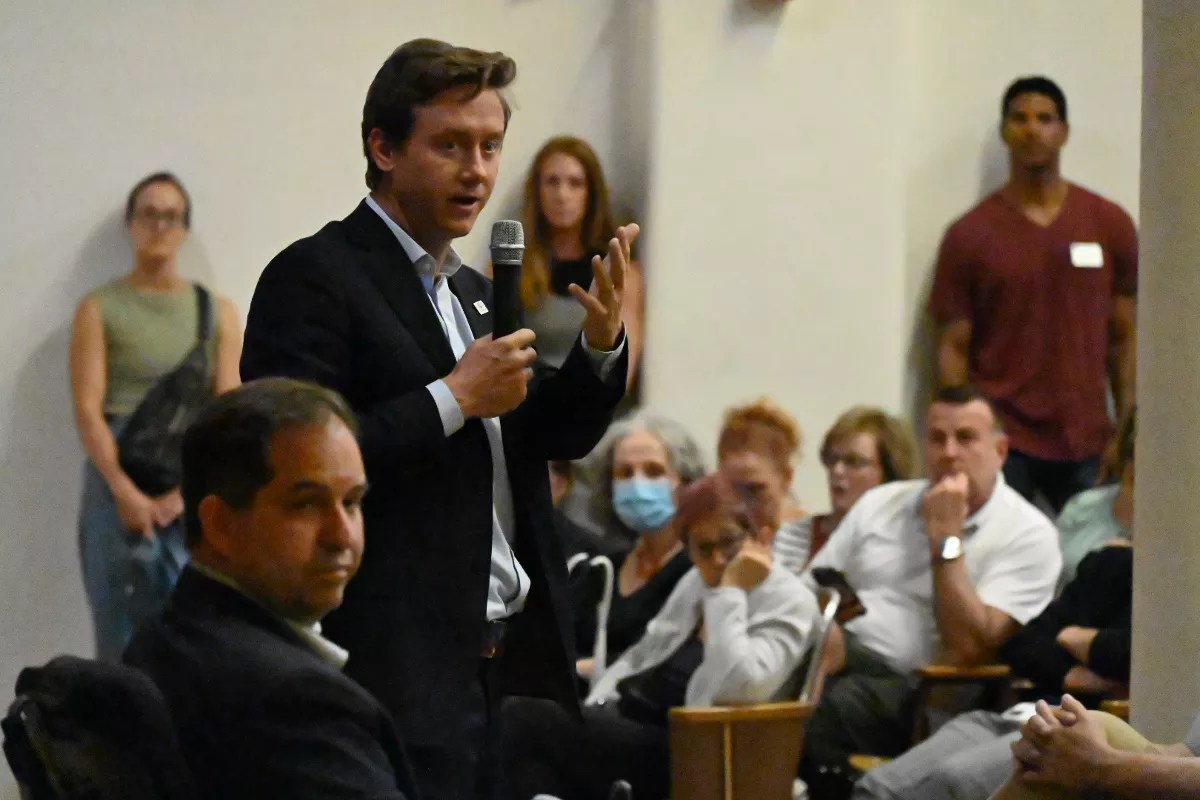
Bennito L. Kelty

Audio By Carbonatix
The holidays are the time to set differences aside, whether they’re over politics, a family spat or – in the case of Steve Charbonneau and the City of Denver – incoming micro-communities.
Like any good family members, Charbonneau and the city have been trying to smooth things out between residents and micro-community service providers in the weeks leading up to Thanksgiving and the December holiday season, with meetings and talks taking place over community fears about the new neighbors.
Charbonneau is responsible for bringing the various parties to the table to chat about the city’s homelessness crisis and helping them come to an agreement about micro-communities in order to move Mayor Mike Johnston’s House1000 plan forward.
Johnston is still hoping to get 1,000 people off the street and into housing by 2024, and then another 1,000 next year.
Charbonneau, founder and executive director of Community Mediation Concepts – a nonprofit that the city has worked with to resolve conflicts over rapid development, power lines and park rules – says he mostly takes on mediation contracts for Denver, but he’s also worked with Thornton, Englewood, Aurora, Northglenn, Lafayette and Adams County.
“I’m a mediator, I’m a facilitator,” he tells Westword. “My job is to get the parties to agree on the points and principles that are important to them, and my job is also to say, ‘What happens if somebody screws up and doesn’t do what they say they’re going to do?'”
Despite what people think, Charbonneau insists that he’s “not the guy that goes, ‘Here’s what you’re going to do.'” His role is bipartisan.
“I’m the guy that works with [two parties] to reach a shared solution,” he says.
Johnston’s office called on Charbonneau to help negotiate a Good Neighbor Agreement between the Overland neighborhood and the Colorado Village Collaborative and work out details about what each expects at the 120-unit micro-community that’s being built at 2301 South Santa Fe Drive.
GNAs are vital to Johnston’s House1000 effort because they help “establish expectations” and “provide for an ongoing communication process,” Charbonneau says. Johnston sees GNAs as a way for residents to keep service providers that are running the micro-communities in their neighborhood accountable.
“The provider, if they don’t keep the Good Neighbor Agreement, we can remove them and bring in a new provider,” Johnston told residents of the Golden Triangle during an October 12 community information meeting. “That is the accountability side. If they don’t meet the expectations you put in place, we can change those providers.”
On November 15, the CVC tried to secure a $3.8 million contract with the City of Denver to run the Overland micro-community, which is the largest micro-community site that Johnston has revealed this year.
The plans for the Overland location have already met with protests from residents and Councilwoman Flor Alvidrez, who represents the area. This ultimately led a Denver City Council committee on November 15 to ask the CVC and the mayor’s office to clear up confusion and try to resolve more of the problems before it approved the contract for a final vote.
At the November 15 meeting, Cole Chandler, Johnston’s senior adviser on homelessness and the founder of the CVC, outlined the steps taken by the mayor’s office with the Overland neighborhood and the CVC. From November 6 to November 24, residents were given a chance to sign up to be a part of the GNA process.
From November 27 to December 1, the mayor’s office will select five to eight residents, including leaders of Registered Neighborhood Organizations and people suggested by Alvidrez, to participate. The first two weeks of December will then be spent hammering out the GNA, according to Chandler.

The City of Denver is looking to Steve Charbonneau to negotiate a Good Neighbor Agreement between the Overland neighborhood and the Colorado Village Collaborative to run the largest micro-community.
Courtesy of Steve Charbonneau
Chandler assured the city council committee at the November 15 meeting that the city would be working with “Steve Charbonneau, who’s done this kind of work in the city for a long time.”
Charbonneau says he’s been involved “fairly minimally” so far with the Overland micro-community, but he’s been working since early on with the mayor’s office – and specifically with Chandler – as the city plans to create Good Neighbor Agreements with residents near all of its micro-communities.
The mayor’s office “is a bit reticent to be a direct party to a GNA” and would prefer that the process take place more between the Overland residents and the CVC, Charbonneau explains.
Johnston is trying to “be there more in the context of a resource,” he adds.
Three micro-communities have been canceled since October, partly because of community feedback, according to the mayor and his representatives. Seven from the original plans are left standing, with only four of them starting construction.
Overland is not alone in opposing micro-communities: Ever since Johnston revealed his ten sites (and one hotel) in late August, residents have complained. One of the micro-communities that was nixed would have gone into an area near Holly Hills, where the residents around the proposed site decided they needed to form a Registered Neighborhood Organization in order to be able to participate in a Good Neighbor Agreement.
Charbonneau understands why a GNA is so important, telling Westword: “As the mayor realizes, whenever you put a provider – whether it’s any kind of homeless provider – into a neighborhood, you’re going to impact a neighborhood. That’s what got us to this spot of needing to put Good Neighbor Agreements together for all of these different micro-communities.”
Even before the CVC contract came up, Chandler reached out to Charbonneau by email and asked him to list some concerns that might come up as the mayor and his staff try to install the micro-communities. Charbonneau told Chandler to expect neighbors to ask him, “Who’s a party to the agreement? How long the program is going to go for? Who’s going to maintain the property? What are they going to do for sanitation operation issues? Are they going to screen the participants? What are the participant expectations and behavior? What are they going to do to manage safety and security?”
The management of “unintended consequences” is always “a big issue” as well, Charbonneau added.
“Where you find the problem are the people that congregate around the outside, the people who prey upon the homeless, the people who take advantage of the services that are offered. Typically not the people inside,” he explains to Westword. “‘How is the operator of a micro-community going to manage these sorts of external, unintended consequences?’ is a significant question.”
At the dozens of town halls and community information meetings that Johnston has hosted with neighbors in recent months, many of the concerns that Charbonneau cited were brought up. “There are very similar issues that come up pretty regularly when it comes to homeless providers and neighborhoods,” Charbonneau says.
Overland residents complained about the size of their 120-unit micro-community (though it was originally slated to host 155 residents); they complained that the city doesn’t seem prepared; they complained about the possibility that a micro-community would bring in sex offenders despite a school bus stop being nearby.

Mayor Mike Johnston talks to Golden Triangle residents who attended a town hall on September 28 to talk about micro-communities in their neighborhood.
Bennito L. Kelty
The complaints are nothing new or out of the ordinary, Charbonneau says.
“What I’m hearing is pretty typical,” he tells Westword. “There are a lot of questions, and there’s a lot of hesitancy from the neighbor’s side,” he says. “In some instances, there’s a certain amount of fear around how this is going to impact the neighborhood.”
Golden Triangle residents, for instance, complained about having to host two sites. Holly Hills residents griped about having their micro-community placed near a busy and dangerous intersection.
“There are nuances for every specific neighborhood that you need to figure out how to address,” Charbonneau points out. “Putting these micro-communities out in all of the different council districts and all of the different areas is a challenge.”
Charbonneau has worked on GNAs between neighborhoods and nearby homeless shelters before, such as the St. Francis Center, the Denver Rescue Mission and the Gathering Place. “I think it was pretty natural when [the city] started looking at micro-communities to say, ‘Hey, who’s been doing most of the Good Neighbor Agreements around this issue?'” he says. “I’m probably the only one that’s working on homeless Good Neighbor Agreements.”
He worked on two GNAs with Chandler when Chandler was the executive director of the Colorado Village Collaborative. “He knew of my work previously,” Charbonneau says. “So when it came to this, he just reached out and said, ‘Hey, you’ve done more of these than anybody else. Can you help us out?'”
GNAs that deal with homelessness, compared to other GNAs, differ in “the way they’re put together” and “the questions you have to ask,” according to Charbonneau. “The different points you need to discuss are different,” he says.
The mediator has been in the business for nearly three decades and recalls how Good Neighbor Agreements first became a part of Denver’s vocabulary around fifteen years ago.
“They clearly didn’t start around homeless provider issues,” Charbonneau says. “They really started around bars, restaurants and neighborhoods and coming to an agreement as to hours of operation and where the music was played, when it was played.”
In addition to working on GNAs concerning homelessness, Charbonneau has also been involved with pickleball and “different parks.” He does “the historic designations when there’s the notice of intent and somebody says, ‘We’ve got to save this house,’ and the person owning it says, ‘No we don’t want to,'” he adds.
“I’ve been involved with neighborhoods, businesses, restaurants, bars,” Charbonneau says. “Any time you’ve got an impact between a business and neighborhood or an activity in a neighborhood, I’ve been involved with a whole bunch of those different things.”
In the end, Charbonneau knows “nobody is going to get everything they want in this process,” so he’s got to just do what he can. “Everybody is going to leave that table going, ‘I wish I would’ve got this, but I guess I’m okay,'” he says.
But one thing is certain: Charbonneau will remain neutral throughout the entire process.
“Almost everybody asks that,” he says, noting how people wonder if he’ll stay impartial to the mayor, residents and CVC. “I could not be doing this successfully for 28 years if I took sides, because you work on your reputation and you work on your ability to come up with good outcomes and satisfy people.”